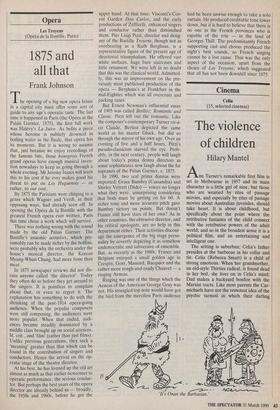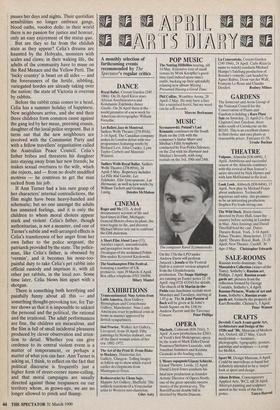Cinema
Celia (15, selected cinemas)
The violence of children
Hilary Mantel
Ann Turner's remarkable first film is set in Melbourne in 1957 and its main character is a little girl of nine; but those who are wearied by rites of passage movies, and especially by rites of passage movies about Australian juveniles, should take heart. It is about childhood, but specifically about the point where the retributive fantasies of the child connect with the retributive powers of the adult world; and so in the broadest sense it is a political film, and an entertaining and intelligent one.
The setting is suburban; Celia's father presides at the barbecue in his collar and tie. Celia (Rebecca Smart) is a child of strong emotions. When her grandmother, an old-style Thirties radical, is found dead in her bed, she lives on in Celia's mind; Dad makes a backyard bonfire with the Marxist tracts. Like most parents the Car- michaels have not the remotest idea of the psychic turmoil in which their darling passes her days and nights. Their quotidian sensibilities no longer embrace gangs, blood oaths, voodoo dolls: in their world there is no passion for justice and honour, only an easy enjoyment of the status quo.
But are they so far from the childish state as they appear? Celia's dreams are haunted by the Hobyahs, monsters with scales and claws; in their waking life, the adults of the community have to muse on the Red Menace and the Yellow Peril. The `lucky country' is beset on all sides — and the forerunners of the fertile, nibbling, variegated hordes are already taking over the nation: the state of Victoria is overrun by rabbits.
Before the rabbit crisis comes to a head, Celia has a summer holiday of happiness. New neighbours arrive, and she and their three children form common cause against the gang led by her mean, preening cousin, daughter of the local police sergeant. But it turns out that the new neighbours are involved with the Communist Party and with a fellow travellers' organisation called the Australian Peace Council. Celia's father bribes and threatens his daughter into staying away from her new friends; he makes sexual overtures to the wife, which she rejects, and — from no doubt muddled motives — he contrives to get the man sacked from his job.
If Ann Turner had a less sure grasp of her characters' internal contradictions, the film might have been heavy-handed and schematic; but no one amongst the adults has unmixed feelings, and it is only the children to whom moral choices appear stark and violent. Celia's father, though authoritarian, is not a monster, and one of Turner's subtle and well-arranged effects is Celia's transference of her anger from her own father to the police sergeant, the patriarch provided by the state. The police- man, like Celia's father, is obsessed by `vermin', and it becomes his none-too- painful duty to take Celia's pet rabbit into official custody and imprison it, with all other pet rabbits, in the local zoo. Some time later, Celia blows him apart with a shotgun.
There is something both horrifying and painfully funny about all this — and something thought-provoking too, for Tur- ner shows us that it is impossible to unknot the personal and the political, the rational and the irrational. The adult performances are fine, the children are miraculous, and the film is full of small incidental pleasures produced by clever observation and atten- tion to detail. Whether you can give credence to its central violent event is a matter of temperament, or perhaps a matter of what you can face. Ann Turner is asking us, I think, to reflect on the fact that political discourse is frequently just a higher form of street-corner name-calling, and that moral campaigns are usually directed against those trespassers on our territory whom, as grown-ups, we are no longer allowed to pinch and thump.



























































 Previous page
Previous page